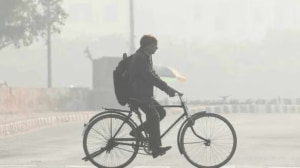China starts arresting fleeing SME bosses
The employees have taken to streets fearing their wages wouldn't be paid once their bosses have fled.
The Chinese police has started arresting owners of small enterprises who closed their units and fled after facing debt crisis that has been created by the government policy of squeeze on bank loans to tame inflation. Besides,unable to repay loans,some owners of small units have reportedly committed suicide. A top Chinese official has admitted that financial troubles have resulted in the bankruptcy of a number of units. Zhao Hongzhu,chief of the Zhejiang provincial committee of the Communist Party of China,has said that the recent debt crisis in the province resulted in the bankruptcy of private enterprises following which a number of owners either committed suicide or fled. Since April,the city of Wenzhou,known for successful entrepreneurs,has been hit by a severe debt crisis. More than 90 bosses of private companies in the city have reportedly disappeared,committed suicide or declared bankruptcy — invalidating debts of about 10 billion yuan owed to banks and individual creditors,pooled from the informal lending market,state-owned agency Xinhua reported.
Police has begun arresting entrepreneurs who have gone into hiding to avoid repaying loans,as authorities move to control the debt crisis in east China from spilling into social unrest,local officials said on Tuesday. Rao Dawei,a shoe factory owner who employs 60 workers,was the first Wenzhou businessman hunted down by the police. The recent debt crisis,precipitated in part by the country’s monetary tightening,has shocked the city. Local officials said Rao fled,owing 800,000 yuan (125,520 US dollars) to upstream suppliers and 200,000 yuan in employees’ wages.
He was caught in his home province of Jiangxi last week,four days after he sold factory equipment and fled with his girl friend.
Latest reports said the police began arresting those who fled. Rao is just one of the more than 90 owners of small and medium-sized enterprises (SMEs) in Wenzhou who have disappeared.
The employees have taken to streets fearing their wages wouldn’t be paid once their bosses have fled. Many factory bosses were believed to hold foreign passports,Xinhua reported.
The crisis was created by the credit crunch created by the repeated rise in interest rates by the Chinese government to curb inflation.
The crisis was such that the owner of one of the units sent his employees on a paid holiday to a nearby resort,then folded up his business and fled. The credit squeeze followed Chinas central bank raising the benchmark interest rates three times this year and hiking the reserve requirement ratio for commercial banks six times. Adding to the woes,China’s exports slowed to 17.1 per cent year-on-year growth in September,from 24.5 per cent in August due to the US slowdown and debt crisis in the euro-zone countries.
The closures prompted Premier Wen Jiabao to visit the place following which the cabinet has cut taxes and ordered state-owned banks to ease the credit squeeze to salvage cash-strapped SMEs in Wenzhou. Businesses expanded rapidly during the credit binge created to stimulate the economy,during the 2008-2009 global financial crisis.
However,businessmen found themselves unable to repay bank loans,and subsequently high-interest informal loans this year,when banks were ordered to tighten lending to curb inflation.
Observers said they were worried that the debt crisis could escalate as informal loans are popular among SMEs across Zhejiang and in neighbouring provinces. Zhao said,”Overall,small and medium-sized enterprises in the province remain healthy. There was no sharp increase in business closures.”
About 91,601 new businesses were registered in Zhejiang from January to September this year,up 12.3 per cent from the same period last year,he said.
Zhao said the debt crisis has complicated causes but is primarily a result of poor management,excessive business expansion,misjudged investment and over-reliance on informal lending.
He said the effects of these policies are beginning to show with some “runaway bosses” having returned with new-found confidence.
The next step for the provincial authorities is to focus on regulating the informal lending market to prevent such a debt crisis from recurring,he added.
Zhao said the authorities will strengthen supervision over informal loans to ensure they mostly go to small companies and individuals who need short-term funds in the initial business phase.
He also said authorities would crack down on illegal fund raising and financing that threatens financial stability.
- 01
- 02
- 03
- 04
- 05































